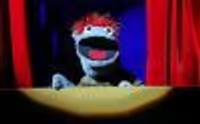Clybourne Park: Review and Rant
#25Clybourne Park: Review and Rant
Posted: 6/24/12 at 5:13pmI think Clybourne Park does not live up to its hype and accolades. I saw the show a day before the Tony nominations were announced and found it to be very disappointing. The play left me cold and I wanted more from it.I also agree that Kirk's performance was annoying and not very genuine. The whole bit about about the neapolitan ice cream in the first act was drawn out way too long and became really annoying! The play did have some enjoyable moments but overall it was not satisfying. Peter and the Starcatcher, Other Desert Cities, and Venus In Fur were all a better night at the Theatre IMHO.
#26Clybourne Park: Review and Rant
Posted: 6/24/12 at 5:19pmI guess we can add uncageg and theaterfan862 to the list of racists.
#27Clybourne Park: Review and Rant
Posted: 6/24/12 at 5:37pmGuess again.
#28Clybourne Park: Review and Rant
Posted: 6/24/12 at 5:39pmWell, I didn't see it on Broadway but in a local production over a year ago. With the assumption that nothing or not much as changed in the dialogue, I was also rather disappointed in how simplistic it was. It is clearly a play that thinks it's edgier and more controversial than it really is. Yes, it's well-written, but it's hardly groundbreaking.
#29Clybourne Park: Review and Rant
Posted: 6/24/12 at 5:40pm
I actually liked the acting, though it was definitely highly stylized and understandably that's not to everyone's taste. With Kirk, I did find her performance a little off-putting at first, but I thought her naive attempt to grapple with the tragedy in her life quite moving because of the way she played her character. Truthfully, I really loved the whole cast, particularly Frank Wood, who I would have given a Tony nomination over Shamos.
As for the play itself though, I do agree that whatever point it's trying to make about race is a little unclear. Though it did inspire an interesting conversation about race on the way home with my friend, I really wanted more from the play in terms of a larger point.
#30Clybourne Park: Review and Rant
Posted: 6/24/12 at 5:54pm
I wonder if I would feel differently about the play with a different director. The overly stylized acting, particularly by Christina Kirk, was very distancing.
I especially thought that the second act was staged as "God of Carnage 2" and was not very interesting. People are outwardly nice, then they deteriorate and act silly -- yeah, yeah, yeah. Someone had mentioned elsewhere that a staging of the second act as a drama rather than a comedy -- where the racist jokes are intended to lacerate rather than draw laughs -- would be more effective, and I agree.
SPOILERS below
As an aside, Owen22 said that he thought what the son did was because of racism. Is there textual support for that? I thought he flipped out during the war because of PTSD or some such thing; it didn't occur to me that he killed civilians (or himself) because of racism.
#31Clybourne Park: Review and Rant
Posted: 6/24/12 at 7:47pm
Wonderfulwizard: I love stylized work. I do. But if no one else is doing a stylized type of acting, then doesn't that just make you a bad actor? Kirk was giving me 50s Housewife, but everyone else was giving me an honest genuine person (Minus the redheaded priest). So.... it's not a choice. At least not one that the whole cast decided to make.
I think my lack of love comes from how trite it all seemed. There was no "big moment." There just wasn't much that ultimately happened. I never really found myself taken back by anything. And I didn't think any of the racism came up too organically. It all seemed a little too written.
#32Clybourne Park: Review and Rant
Posted: 6/24/12 at 8:05pmAlso, the text doesn't seem to call for stylization. Nothing else is stylized. It's naturalistic dialogue.
luckyleo81
Swing Joined: 6/21/12
#33Clybourne Park: Review and Rant
Posted: 6/24/12 at 8:34pmI actually just saw the play last night and am happy that I'm not the only person who didn't understand all the accolades. Kirk's performance made me feel like I was watching a two hour SNL sketch starring Kristen Wiig. The first 15 minutes of the play about Neapolitans and capitals seemed to have nothing to do with the actual plot but just some nice points that can be thrown throughout the remainder of the play. (I mean, I guess it could be looked at as a discussion of how these people are worldly but lack the insight to understand their relationship with different people in their own country, but I think I'm just trying to force the puzzle to come together with that one). It did get better as it went along but nothing really clicked. The acting is alright but nothing wonderful, the jokes are alright but nothing new, and the underlying message is important but nothing people with common sense don't already know (and lets face it, if you can afford to go to the theater today, or even just have the basic desire to go the theater, you probably have some semblance of common sense). Also, the last part of the play was frustrating because I knew their was supposed to be a message their but I just couldn't get it. The only thing more annoying than having a message shoved down my throat is when someone is trying to shove one down but I can't figure out what it is.
#34Clybourne Park: Review and Rant
Posted: 6/24/12 at 8:45pm
LuckyLeo: 100% agree.
I have to say it is a better play than Other Desert Cities. Only because it's trying to do something different, and like someone said earlier, I think the structure of the play is great. However, I don't think how things unfold is necessarily anything special. I mean having a character in Act II say "I have something important to say." Just strikes me as false.
#35Clybourne Park: Review and Rant
Posted: 6/24/12 at 10:12pm
I agree with RippedMan that "Clybourne Park" is a better play than "Other Desert Cities". All of the mixed reactions have only made me more interested in seeing the Broadway production. Not to beat a dead horse, but honestly and truly - the recent Steppenwolf production in Chicago was one of only four theatrical experiences I had this year that truly, deeply, moved me. (The others were Chicago Shakespeare Theatre's "Follies", Theo Ubique's "The Light in the Piazza", and the Goodman's "Camino Real".)
I am very sad to be away from the east coast during this season which has presented delectably divided opinions of the work being done in New York. Mixed reactions only want to make me see things so I can establish my own!
#36Clybourne Park: Review and Rant
Posted: 6/24/12 at 11:18pm
See, I guess that's where our view of the acting differs, because I found the acting of the whole cast in the first act to be stylized, though Kirk was clearly the most extreme of that style. It all felt like a sitcom-esque style of performance.
I will say that I completely agree that the racism in the second act felt incredibly forced. When Annie Parisse's character said all of her friends were black, I groaned not because of the stupidity of the character, but because it didn't feel organic whatsoever.
#37Clybourne Park: Review and Rant
Posted: 6/24/12 at 11:23pm
I think that stems from the acting though. I think that line could be really funny because who hasn't heard someone say that? I just don't think she, as an actress, created a totally believable character. I was very aware she was acting the whole time. Where as the black couple - I don't know names, sorry - were totally believable as a couple and as just stand alone characters. Their interactions with each other and the little looks they'd give each other. I loved that. But Parisse was just schmacting the whole time.
I'm curious to know what was so moving in this show? I don't think even at it's best that this show would be considered moving?
#38Clybourne Park: Review and Rant
Posted: 6/24/12 at 11:35pm
Absolutely. The way she said it was such that it seemed that the character was in on the joke, or was almost winking at the audience.
The more I think about the second act, the more I feel this play could have a lot more power if the racism wasn't so overt. Maybe this is a naive thing to say, but while I think people are certainly racist today, I think it's a much more subtle sort of racism. Most people won't ever say such overtly prejudiced things, or at least come out with them as quickly as these characters do. Though the second act would lose a lot of the humor, I think it would be a much more unsettling and powerful show. As the play stands right now, I think it lets the audience off a little guilt free, because instead of asking the audience to consider Americans today deal with race and how they themselves may still carry some prejudice, it instead allows the audience to leave being thankful they aren't as bad as the characters on stage.
luckyleo81
Swing Joined: 6/21/12
#39Clybourne Park: Review and Rant
Posted: 6/24/12 at 11:50pmAlso, what was the point of having a deaf character in act 1? It almost seemed like while writing act 2 they realized they needed another female character but had nothing for her to do in act 1 so they just said "let's make her deaf so we can milk some laughs out of her disability (for lack of a better word) but put a wall between her and the other characters so she doesn't interfere!" I kept waiting for the deafness to be addressed in the second act but it was just used as a mark to connect that the character in act 2 was the daughter of a couple in act 1. If you are going to create a play that tackles the development of how blacks and whites interact over time, why make the deliberate choice to add a deaf person without somehow tackling the development of how hearing and deaf people interact over time? It's a dramatic cop out to me.
MrJNLong
Featured Actor Joined: 6/20/08
#40Clybourne Park: Review and Rant
Posted: 6/24/12 at 11:58pm
Interesting discussion.
I just saw it last week and did come away quite moved and provoked by it.
For me, Kirk's line to her son "I feel like it's getting better." or something like that was heartbreaking because we had just witnessed that 50 years later it hadn't gotten much better at all. For me, it was a reminder from the playwright not to get too smug and think that we as a society have moved on. Aren't we great? No, this is still a problem we still need to address in our society. And I also felt like he reminded us as the play went along that it's not just racial prejudice, but we saw that the same goes for physical handicaps, emotional handicaps, sexuality, economic status, etc...
I very much appreciated that.
So that's why it was moving to me.
Also, it sparked much conversation afterward...more than any other show (and I ssaw 23 in 16 days on my annual New York summer theatre binge) which I think is really all Norris was going for...
However, I was also put off by Kirk and her character. The only thing I liked about it was how much I hated her in the first 20 minutes but then later, at times she was the closest to reasonable so then I felt bad for initially hating her. So I don't know if that choice was on purpose, but ya she did feel like she was in a different play.
And I was left still unsure about the son who killed himself. Why did he do that? I want it to be because of the way he was treated by the community because of some sort of prejudice...but I never really was able to put my finger on his experience and what prejudice that was. Who did he kill and why and why did people hate him and why did he kill himself?
Wish that had been a teeny bit more clear.
But I really appreciated the play as a whole and my experience with it...
ZiggyCringe
Leading Actor Joined: 5/16/05
#41Clybourne Park: Review and Rant
Posted: 6/25/12 at 12:09am
WOW, both "Other Desert Cities" AND "Clybourne Park"???
I saw them both, and I LOVED them both. "Cities" was about politics, and "Park" was about race. They both were thrilling evenings in the theatre. I'm just thankful that they both happened in a single season. When does that happen?
ZiggyCringe
Leading Actor Joined: 5/16/05
#42Clybourne Park: Review and Rant
Posted: 6/25/12 at 12:23am
"Also, what was the point of having a deaf character in act 1? It almost seemed like while writing act 2 they realized they needed another female character but had nothing for her to do in act 1"
Umm, the "Point" of having a deaf character is pointing up the fact that we're all the same. We are all the same.
#43Clybourne Park: Review and Rant
Posted: 6/25/12 at 12:33am
To be fair, I didn't care for ODC much, either. I found it to be fairly by-the-book "dysfunctional family drama", full of cheap and easy political jabs and with a twist notable for being both predictable and ridiculous. Entertaining, sure, in the way soap operas are.
Both Clybourne Park and ODC, I think, have the flaw of pandering to their audiences' social views. A theatre-goer can go to ODC to get Republican jokes and political hypocrisy, then go to Clybourne Park and laugh at racists while shaking their heads and saying, "Thank god I'm not like them!"
I already am aware of political hypocrisy and the fact that there's still a ton of social inequality. I want something more than to have Bruce Norris smugly point out nothing's gotten better. In the light of the Trayvon Martin case, Clybourne Park, to me, seems even more slight. These plays point out the evident, and seem content at scratching wounds. If you're going to target a social wound, either gouge at it with a dagger or salve it. Particularly during this election cycle, which is seeing so much social regression against woman, against African-Americans, against Latinos, against gays.
But from these two plays, I feel that all I got was glibness.
In terms of mainstream plays last season that desperately wanted to make a social point, I'd say only Tribes succeeded for me. Boy, was it interesting to see that after seeing Clybourne Park... it made Parisse's deaf housewife make me retroactively squirm.
#44Clybourne Park: Review and Rant
Posted: 6/25/12 at 12:35am
RippedMan,
At least for me, the final tableau of the mother seeing her son for what may have been the very last time brought me to a REALLY unexpected emotional catharsis (i think the comic style of the play disarmed me) - "Everything will get better" - the idea that if we continue to sweep things under the carpet, they'll go away - be it our family's strange behaviors and skeletons, or the ugly head of racism - and now matter how much blind faith or hope we may have in it, sometimes things are still so f*cked up that you strangle yourself.
I think that while "Clybourne Park" is obviously about racism, it is just as much about denial, and how we as Americans in the pursuit of our "American Dream" only fall deeper and deeper into denial.
#45Clybourne Park: Review and Rant
Posted: 6/25/12 at 12:41amWas that the point of the deaf character? Because it seemed to me that all she was was the butt of jokes, and then dropped completely. The idea of a "symbolic" nature of her character was not lost on me- a sort of comment on the disparity in inequality, a willingness to accept some otherness but not others, etc. But in the end, Norris just seemed content to have her become a gag without ever really touching those ideas. Hell, I would have even been more willing to accept it if he'd tied in some deaf/disabled jokes in the second act.
Tom5
Broadway Star Joined: 9/23/11
#46Clybourne Park: Review and Rant
Posted: 6/25/12 at 8:34amAt this point in time I find racial put downs and jokes old hat and tiresome. I flee from them. Norman Lear did it first and better in the 60s and 70s with All In The Family and especialy The Jefferson and while I haven't seen this production I doubt very much any of the actors in it could hold a candle to the charisma and talent of Sherman Hemsley.
#47Clybourne Park: Review and Rant
Posted: 6/25/12 at 8:49am
I'd like to focus on the comments about Christine Kirk's performance. I was fascinated by her CHARACTER because I really recognized this woman -- someone without an ounce of believable sensitivity in her whole body -- someone who is always "acting" when in a crowd. And the fact that an actress could play this character and so confuse the audience into thinking it was the actress acting artificially rather than the character acting artificially says a lot about how on target her performance was.
Brian07663NJ
Broadway Legend Joined: 6/21/06
#48Clybourne Park: Review and Rant
Posted: 6/25/12 at 9:00am
This is one of those moments where I read what the professional critics reviews are, see what awards were given and I ask myself "Did I attend this play? Did I see the same show that they saw?"
What troubled me was not that the play was filled with lame, been there heard these exact racial jokes before but that the audience was gasping in horror as if it were the first time they heard a race joke. Why? It wasn't a shock. It didn't come out of the blue. We knew the play focused on race issues.
This won a Pulitzer Prize? This won a Tony Award? Why? I frequently asked myself which situation comedy on television did this before...All in the Family? Different Strokes? The Jeffersons? Many of those shows, now decades old, visited the race issues so Clybourne Park has not broken new ground nor do I think they presented it in a new way.
I did enjoy watching a gentleman sitting in a box seat heartily laughing and actually slapping his knee at the antics taking place on stage. He gave a much more enjoyable performance than the material being presented on stage.
Patash - I completely agree with you about Christine Kirk. Whenever she spoke I wanted to hear what she had to say. I thought she was a wide range of emotions (between both the first and second acts)- funny, quirky, weird, dumb, intellectual...exactly like Edith Bunker.
#49Clybourne Park: Review and Rant
Posted: 6/25/12 at 1:40pm
True. There were a lot of plot points that were more about a prejudice than an all-out racism. Like the son being treated poorly by the community because of his "condition." Or the way people interacted with the deaf girl as if she was a child.
It's like in the second act when the guy says "And I'm gay." And then it just makes the joke funnier. That's when I was like "This is some poor writing." Nothing came up organically. It could have been a lot more awkward, interesting, if when the guy got the phone call, the audience overheard him saying something that would have hinted at his being gay, and then we would have been let in on something which would have raised the stakes in the conversation, etc.
WonderfulWizard: Totally agree about Act 2. It is a lot more subtle today. Like when you're walking late at night and a group of black guys are walking towards you and you suddenly grab your wallet, or something. Ya know?
Videos







